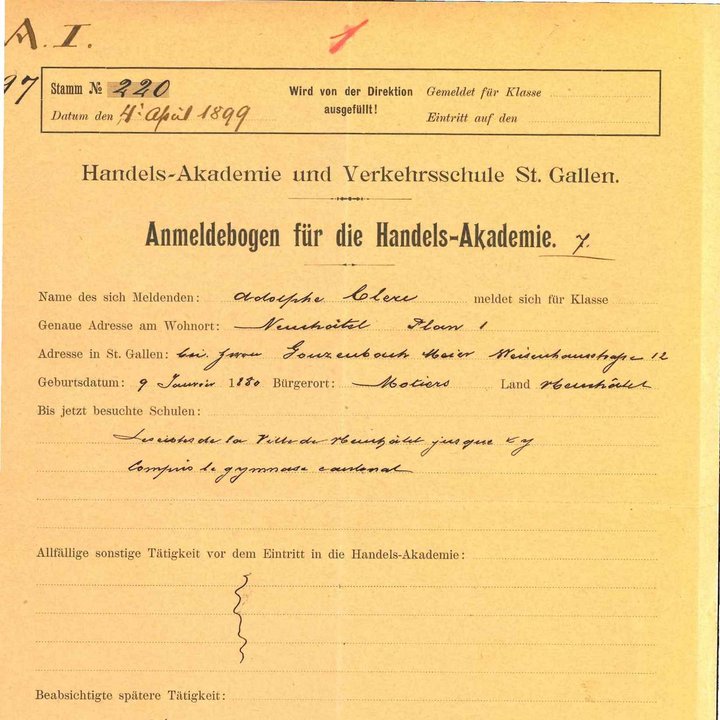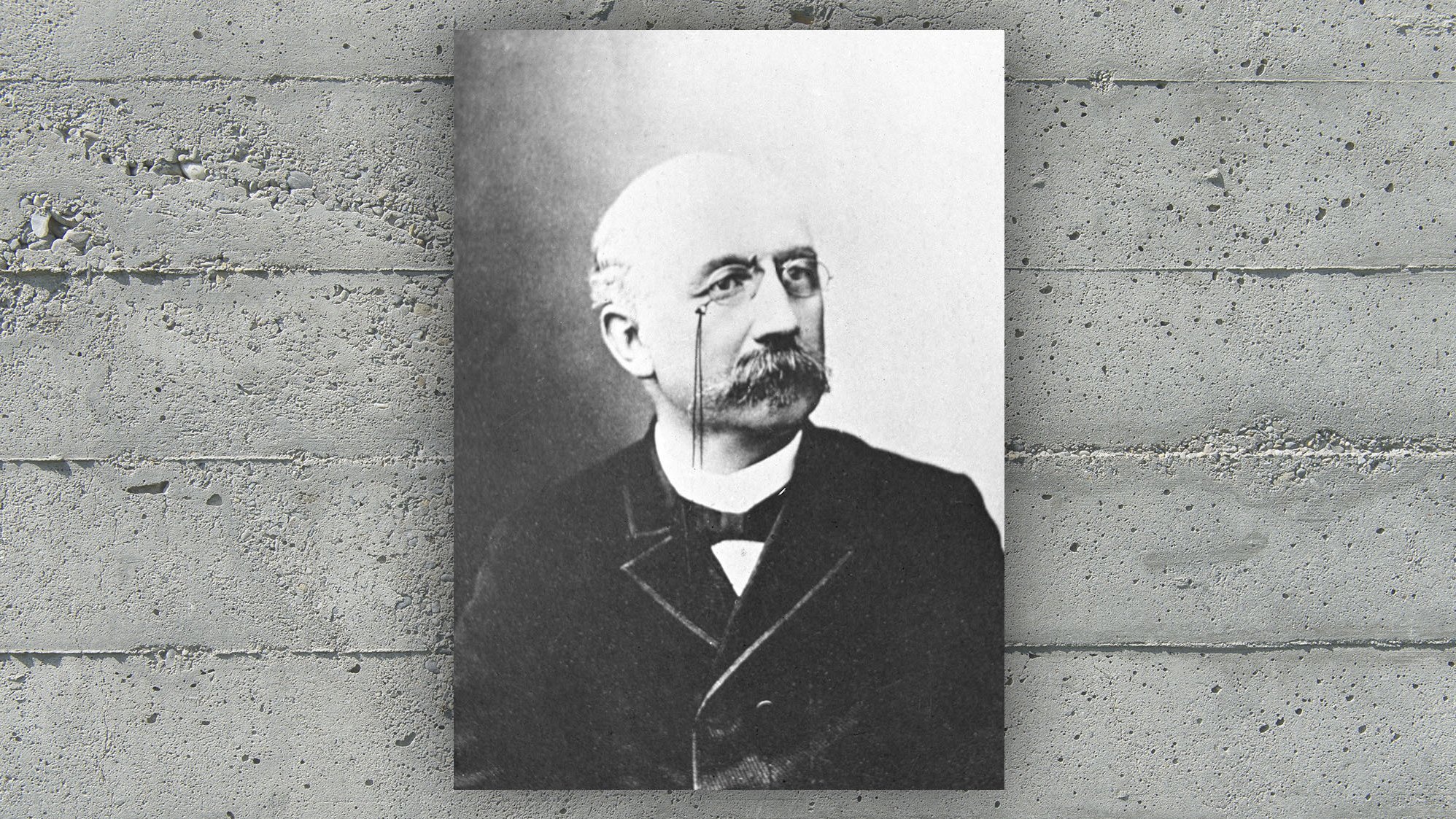1898: Our beginnings


The export-oriented economy of the city of St. Gallen was based on the embroidery industry and was therefore very susceptible to crises. To be able to hold its own against foreign competition, it was considered vital, at least by some of the St. Gallen business community, that young men should receive vocational training. Numerous institutions were dedicated to training the next generation of business specialists. One demand of the business community was that the mercantile department of the cantonal grammar school be expanded from three to four classes. This aim was supported by politicians as well as by local and federal government bodies, and the discussions finally culminated in the plan to set up a business academy in St. Gallen.
Three people in particular were committed to the idea of an institution of higher learning in St. Gallen: Theophil Bernet, Georg Baumberger and Theodor Curti. The first im-pulse came from Theophil Bernet (1868-1946). Bernet worked in the secretariat of the Zurich Commercial Association and became professor for the commercial subjects at the Department of Commerce of the Zurich Cantonal School in 1897; from 1907 to 1935 he was the school’s director.
On 18 December 1895, Bernet suggested to his fellow citizens of St. Gallen, in a lecture which he had been invited to deliver by the St. Gallen Commercial Association, that there should be a school of higher learning in St. Gallen to teach commercial subjects. Whether the first impulse actually came from Bernet may be doubted. He had indeed been the first to express the idea, but his idea found neither resonance nor support in the local community. In a letter dated 23 August 1947, Carl Brüschweiler emphasised that it was Professor Steiger who gave the actual impetus for the foundation of a commercial school; Steiger wanted to have an experimental institute for the textile industry together with a commercial college, as this would best suit the economic interests of St. Gallen.
Georg Baumberger (1855-1931), chief editor of the Die Ostschweiz newspaper, took up Bernet's suggestion a year and a half later. As he explained in an article attributed to him in the newspaper of 16 July 1897, St. Gallen was excellently suited as a location for a federal academy of commerce thanks to the lively spirit of its industrial policies. Baumberger strongly advocated for the foundation of such an institution.
This situation marked the emergence of Theodor Curti (1848-1914), who is rightly regarded as the actual founder of the institution. Curti had studied medicine and law in Geneva, Zurich and Würzburg. He was National Councillor between 1881 and 1902, member of the Cantonal Council of St. Gallen between 1894 and 1902 (Landamman from 1898 to 1900), as well as Head of the Department of Economics.
On 24 September 1897, Curti was tasked by the canton to examine thoroughly whether St. Gallen would be suited as a location for a federal academy of commerce. At that time, the idea of a federal educational institution was still highly relevant. Art. 27 of the Federal Constitution of 1874 had granted the federal government the competence "to establish or [...] support other institutions of higher learning" in addition to the Polytechnic in Zurich (known since 1911 as the ETH), which had been founded in 1855. Curti had championed the idea of a federal commercial academy – albeit based in the canton of Ticino – as early as 1882 (i.e. long before Bernet and Baumberger). He saw it as a matter of destiny for Switzerland as an exporting country: "What we can accomplish is to educate a well-trained mercantile class that knows how to enter into the foreign world – to fill young minds with enduring love for the civilisational tasks of world trade, and to make those changes and fluctuations that occasionally threaten Swiss factories more bearable". Alas, the Ticino project was not realised.

In 1890, the Swiss Commercial Association had recommended the establishment of an "École supérieure de commerce" at the ETH in Zurich (in the above-mentioned sense whereby technology and business are linked together). This project too assumed that a high level of education should be as naturally expected from businesspeople as it is expected from lawyers, doctors, teachers, and engineers.
In St. Gallen, Curti’s idea of a federal commercial academy had been advocated, as already mentioned, by Bernet (1895) and Baumberger (1897). According to Bernet, St. Gallen was the right location for such an institution because of the city’s important role in the export economy. Baumberger too favoured the idea that the foundation should be a matter for the federal government, because "trade and industry are such enormous factors in Swiss economic life, and the continued economic existence of the entire country depends so much upon them, that it is the federal government who should establish and maintain such an institution. For only then will this institution be able to grow, expand and receive all the equipment that it needs; only then will it also achieve the general character that is necessary". Baumberger prophesied that the foundation of a commercial academy was only a matter of time and that, if St. Gallen did not realise it, Zurich would.
Why the academy finally came about as a cantonal and municipal institution seems to be primarily due to the rather negative attitude shown by Bern. A business academy was some-thing new and unknown at that time, and its future development uncertain. After various cantons (Basel, Zurich and St. Gallen) had discussed the establishment of business academies, the Federal Council abandoned the idea of establishing a federal institution, providing support only to cantonal business schools. The decision not to found a federal institution of higher learning in St. Gallen must also be seen from a national perspective. This decision marked a turning point, and in the following decades the federal government did not establish any institutions of higher education at all. The federal government maintained only the ETH Zurich, while it left the universities (including the University of St. Gallen) to the cantons.
However, Curti’s commission from the Cantonal Council was still based on the idea of establishing a federal educational institution, and it was only in the course of the following months that an alternative solution was found instead. Curti headed the "Special Committee for the School of Commerce", which included as its members the representatives of the Canton, the representatives of the Industrial Association, the Directorate of Commerce, the Municipal Council and the Board of Directors of the Citizens' Community (Ortsbürgergemeinde), including also the initiators Bernet and Baumberger. It took a few meetings to formulate the draft (6 May 1898) which the Grand Council then approved unanimously (with two abstentions) on 25 May 1898: "A school of transport administration and a higher school (academy) for trade, traffic and administration shall be established in the city of St. Gallen". Additionally to the federal contribution, half of the expenses was paid by the canton, while the political community, the citizens’ community and the Directorate of Commerce of St. Gallen paid the other half. Despite the different starting positions and the political differences, the school bill was unanimously approved, which was probably due in no small part to Curtis’s negotiating skills.
Just one year after its founding, the "Handelsakademie und Verkehrsschule St. Gallen" (St. Gallen Business Academy and School of Transport Administration), as it was now officially called, was inaugurated in a modest opening ceremony on 3 May 1899.